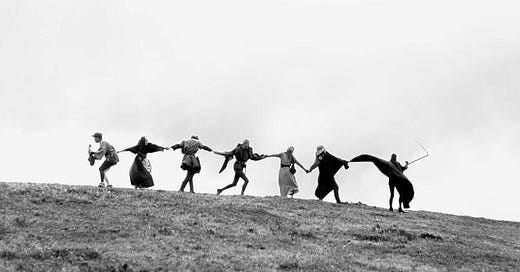When Heaven Is Silent
“I still think very much about death, but after this picture, it’s not an obsession anymore.”
Ingmar Bergman’s The Seventh Seal is a difficult film. Not so much because its subject-matter is particularly distressing (though there’s surely plenty to be said for that), but because it overwhelms with its stylized artistry. Some elements are fairly easy to grasp (particularly the compositional work of legendary cinematographer Gunnar Fischer) yet there always seems to be a bit more just out of reach. Perhaps that’s the point.
The film makes heavy use of allusion: the title and opening line pulled straight from The Book of Revelation, the pivotal scene a recreation of Albertus Pictor’s “Death Playing Chess.” Bergman uses these pieces to craft an even larger picture, one not content with allusory glances; The Seventh Seal is a visual ekphrasis of a movement, a reflection on Modernism.
In the second chapter of F. Scott Fitzgerald’s The Great Gatsby, Tom Buchanan takes the story’s protagonist, Nick Carraway, to an apartment in New York City to meet Tom’s mistress, Myrtle: drinking and shenanigans ensue. As the partying roars into the night, Nick gazes out the window, imagining himself as a passerby on the street, “I was within and without, simultaneously enchanted and repelled by the inexhaustible variety of life.” This was Modernist literature. Born from the remnants of World War I, it would persist through World War II, wrapping itself in absurdism, disillusionment, and isolation.
“Simultaneously enchanted and repelled by the inexhaustible variety of life…” This is what The Seventh Seal represents.
Released in 1957, at the tail end of the movement, The Seventh Seal’s Antonius Block is a quintessential Modernist protagonist. Rather than suffering the aftermath of the World Wars, Block is forced to cope with the more topical Crusades, a war fought entirely in the name of God, making Block’s alienation from his Lord and his own senses all the more pertinent.
Yet while the disposition of Modernism leaned heavily toward the skeptic, Bergman is unwilling to fully cast belief aside. Instead, he posits a Machiavellian view of Christianity. Block must have proof he isn’t a villain, must have a reason for his actions. Going so far as to let a girl be burned at the stake in order to prove she is possessed by the devil, because if the devil exists so must god. Is it a vicious cycle he has formed himself? Desensitized by a war he now seeks to rationalize. For his efforts Block is rewarded with emptiness, he looks for God but all he can see is Death. For the knight the only world that matters is the next, and because of that, he shall never find it. Bergman refuses to condemn all men thus. Jof the jester has faith, but it doesn’t drive him, Jof is driven by sympathy, he accepts the life he has and attempts to make the best of it, for himself and others. Jof is granted a vision of Mary and Jesus–as real for him as Death is for Block–and later is the only witness to the fate of Antonius and the others.
Bergman does not hate people of faith, but he has no patience for those who can’t be anything but that. When there is silence in heaven, it is not for us to demand to know why but to watch, and to take what we are given; be it trumpet or fire. Thus, Block’s journey escorts us through the Modernist mindset. Despair, loss, alienation, at once enchanted and repelled by the inexhaustible variety of this “Wasteland.” Bergman makes heavy demands of the viewer; Like Jof, he presents them with a broken vision, there is an apparent order but we must work to make it clear.
But it is not only work for the viewer. Bergman has created this vision as much for himself as anyone else. It is not only a reflection of Modernism, it’s Bergman’s response to it.
I wrote this, er, Seventh Seal. And The Seventh Seal is about Death the whole time. Death is present the whole time in this picture and everybody in this picture reacts differently to Death. And after that picture…of course I still think very much about death, but after that picture, it’s not an obsession anymore. I just kind of live with it. So that, er, the picture was a good medicine.
–Ingmar Bergman
Bergman made The Seventh Seal to manage the Modernist in himself as well as the world. To take this skepticism, isolation, and loss and channel it in order to become like Jof. To accept the reality of death, and live anyway.
How fitting then that Antonius Block’s one moment of true happiness in the film is in his meeting with Jof. Block is given strawberry and milk and is allowed to rest. A moment’s peace in a man’s quest to conquer death.
In front of and behind the camera.




![The Seventh Seal | film by Bergman [1957] | Britannica The Seventh Seal | film by Bergman [1957] | Britannica](https://substackcdn.com/image/fetch/$s_!mPpC!,w_1456,c_limit,f_auto,q_auto:good,fl_progressive:steep/https%3A%2F%2Fbucketeer-e05bbc84-baa3-437e-9518-adb32be77984.s3.amazonaws.com%2Fpublic%2Fimages%2F69456c3f-5589-4091-acbe-f8ee07adcb66_1600x1133.jpeg)



Great work, dude. Take care!